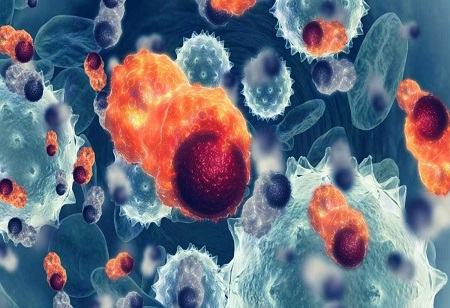Vishal Pratap Singh | Friday, 13 May 2022

There has been a rise in the adaptation of new therapeutics for the treatment of diseases and increase in implementation in the healthcare sector is creating new opportunities for the players of this market. These therapies are naturally made by the body or in a laboratory to improve the immune system and sometimes in its restoration.
Immunotherapy uses drugs to suppress or stimulate the immune system to help the body fight against any infection and other diseases.
The immunotherapy market is expected to grow at a CAGR of 13.8 per cent from 2018 to 2024 to reach USD 152.83 billion by 2024. That being said, in this article lets understand, what are the different factors and incidences that gave rise to the growth of Immunotherapy market.
Outburst of COVID-19 There has been a positive impact of COVID-19 on the immunotherapy market because many companies across the world came up with the concept of developing immunotherapy based drugs or vaccines for COVID-19. Experts say that immunotherapies are an adjunct therapy in severe COVID-19 cases among patients.
There has been a rapid growth in immunotherapy market in the last two decades due to the rising adoption of targeted therapy over traditional ones, rising prevalence of chronic diseases, lifestyle disorders, rising demand for monoclonal antibodies and emergence of new bio-similars. “Successful companies working in the immunotherapy space have to take on both active and passive immunotherapy and both of those require technologies that are based on genetic modification”, says Laurence Cooper, CEO, Ziopharm Oncology.
Increasing Cases of Cancer From the last few years, cancer cases are rapidly increasing across the globe. Moreover, the mortality rate due to cancer has also witnessed a rise from 8.2 million deaths in 2012 to 9.4 million deaths in 2018. A study found that lung cancer is one of the most common forms of cancer globally. According to World Health Organisation, the total number of people living with lung cancer is 2.27 million in the year 2020 which is expected to increase 2.70 million by 2023.
The rising cases of cancer are increasing the adoption of cancer immunotherapies. The increasing survival rate in the patients adopting cancer immunotherapy as a treatment is a good sign for the immunotherapy market. “If we look at the complexity of the immune system, there are so many targets that we can trigger and many are still there to be explored”, says Mariola Sohngen, CEO, Mologen.
Effectively Acting on Target Cells Treatments like chemotherapy and radiation therapy have adverse effects associated with them due to which it is the major concern among healthcare experts as well as patients. There are drugs such as Opdivo and Keytruda which are known to trigger the immune system of the patient in order to destroy the oncogenic cells. Immunotherapy helps in acting upon the target cell in a much effective manner that cannot be captured by the chemotherapy.
Immunotherapy treatment selectively attacks only the cancer cells and not damages the good cells around them. Due to these factors, products such as monoclonal antibodies, check point inhibitors and cell therapies are widely adopted for better efficacy and effective therapeutic actions.
Growing Adoption of Checkpoint Inhibitors Majority of players in the cancer immunotherapy market are focusing on the development of checkpoint inhibitors. Big players are collaborating with other players to fasten the development process and access the latest technologies.
For example, few years back a US based company named Merck collaborated with Dynavax Technologies Corporation to investigate the potential synergistic effects by combining Dynavax’s SD-101 with two of Merck’s immunotherapies Keytruda and MK-1966. “We are actively engaging in a partnership discussion with a number of large pharmaceutical companies as we believe that there could be a positive combination therapy strategy”, says Dr. William Williams, CEO, Briacell.
Monoclonal Antibodies Also, there has been an increase in the number of approved monoclonal antibodies per year since 2014. Earlier very low number of monoclonal antibodies were developed per year but now it is witnessing large scale development phase. Infact in 2017, ten new monoclonal antibodies got approval which is a record in itself. These antibodies are present in the mainstream markets around the globe.
Focus on Research and Development There has been a growth in the research and development by pharmaceutical and biotechnology companies across the country. Many research organisations are also collaborating to study jointly about the antibodies. For example, Gilead Sciences and Humanigen collaborated to jointly study lenzilumab with YESCARTA in patients with relapsed or refractory diffuse large B-cell lymphoma. These research and development activities are developing novel immunotherapies for various chronic diseases which are anticipated to drive the global immunotherapy market growth.
What’s next for Immunotherapy Market With the introduction of Ayushman Bharat- National Health Protection Scheme by government of India and similar other schemes across different countries has shown significant existence of government participation in healthcare sector. Currently, the treatment is limited in developing regions such as India, China and Latin America and is anticipated to witness a higher graph in the coming years. It will benefit the growth of the immunotherapy market across the globe.